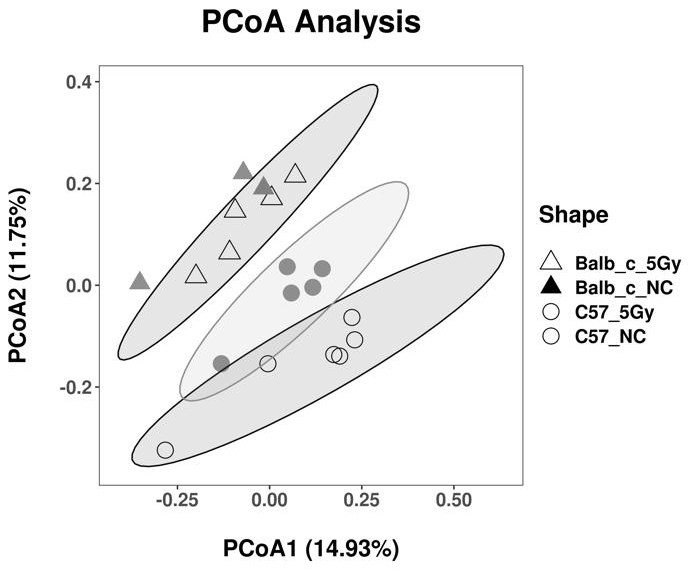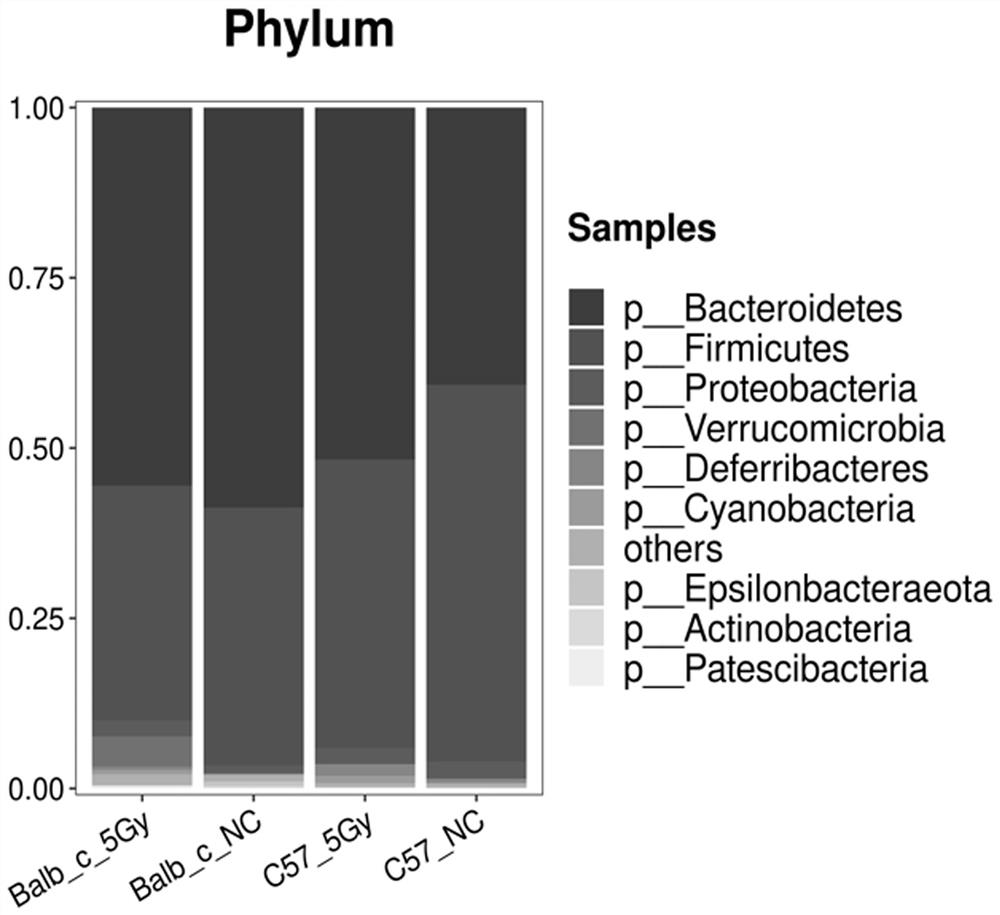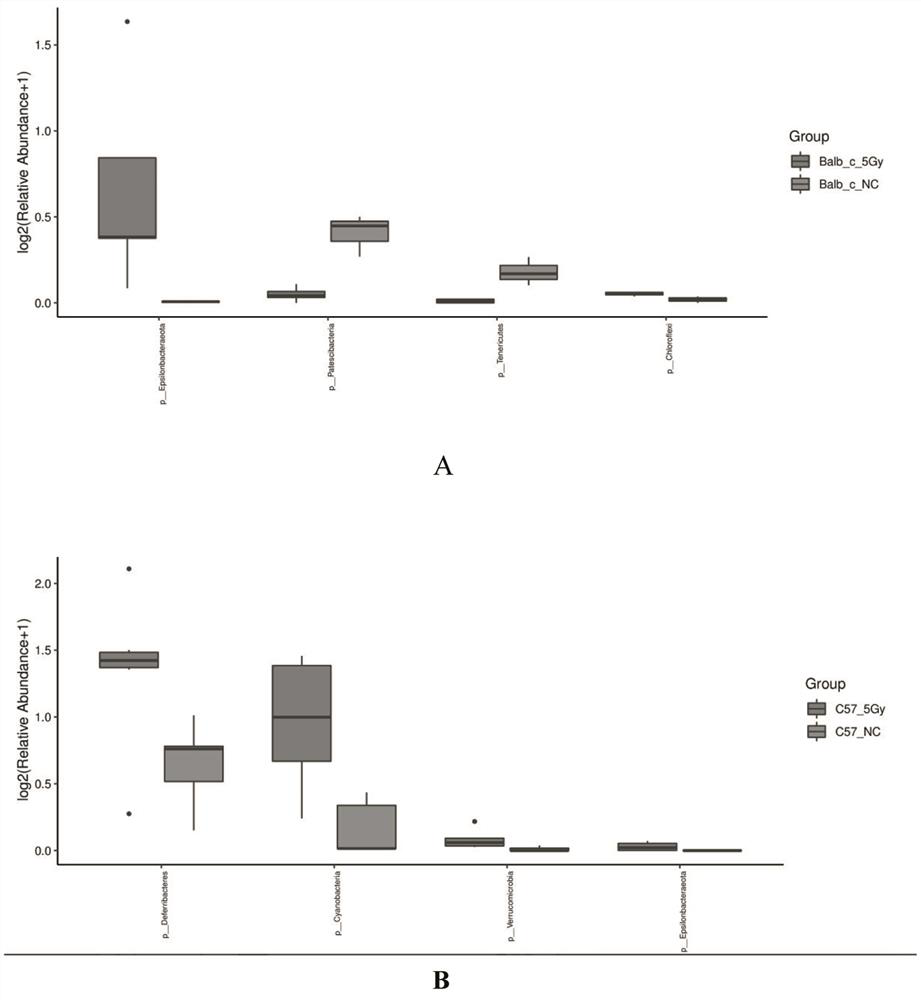A biomarker, kit, detection method and application thereof for detecting or assisting in detecting proton ray radiation
A technology for biomarkers and auxiliary detection, applied in biochemical equipment and methods, measurement/testing of microorganisms, DNA/RNA fragments, etc., can solve the problems of lack of proton radiation detection methods
- Summary
- Abstract
- Description
- Claims
- Application Information
AI Technical Summary
Problems solved by technology
Method used
Image
Examples
Embodiment 1
[0041] Utilizing Microbiome Biomarkers Cyanophyta Cyanobacteria , ε Proteus Epsilonbacteraeota , Anaerovorax , Helicobacter Helicobacter At least one method of detecting whether a sample has been irradiated with proton rays:
[0042] 1. Experimental procedure
[0043] 1.1 Microbiome total DNA extraction
[0044] The CTAB method was used to extract the total DNA of the microbiome from the mouse feces samples, and the quality of the DNA extraction was detected by agarose gel electrophoresis, and the DNA was quantified by an ultraviolet spectrophotometer.
[0045] 1.2 PCR amplification
[0046] The DNA obtained in step 1.1 was amplified using the primer set in Table 1, wherein the PCR reaction system and conditions are shown in Table 3 and Table 4, respectively.
[0047] Table 3 PCR reaction system
[0048] PCR Reaction Components PCR reaction volume Phusion Hot start flex 2X Master Mix 12.5 µl Forward Primer 2.5 µl Reverse Primer 2.5 µl...
Embodiment 2
[0058] Bioinformatics analysis process
[0059] 1. Data splitting
[0060] For the paired-end data obtained by sequencing, it is first necessary to split the data of the sample according to the barcode information, and remove the adapter and barcode sequence.
[0061] 2. Data stitching and filtering
[0062] The specific steps are:
[0063] 1) Remove the primer sequence and balanced base sequence of RawData; where the software used is cutadapt (v1.9), parameters: '-g R1 -G R2 -n 1 -O 17 -m 100';
[0064] 2) Merge each pair of paired-end reads into a longer tag according to the overlap region; the software used is FLASH (v1.2.8), parameters: '-m 10 -M 100 -x 0.25 -t 1 -z';
[0065] 3) Perform window quality scanning on the sequencing reads. The scanning window defaults to 100bp. When the average quality value in the window is lower than 20, the part of the read from the beginning of the window to the end of 3' is cut off; the software used is fqtrim , parameters: '-P 33 -w...
Embodiment 3
[0078] 1. Select male mice aged 6-8 weeks, and raise them in an SPF animal room for 1 week before irradiating proton rays to adapt to the environment. They are given sufficient water and feed, and the light time is 12:12 hours. The animal ethics conforms to military medical research. The relevant regulations of the Institute of Radiation Medicine of the Chinese Academy of Sciences. Among them, the mice are Balb / c mice and C57BL / 6 mice, which were purchased from SPEF.
[0079] Put the mouse into the device and perform 5Gy whole body irradiation sequentially. After 3 days, take about 5 pieces of mouse feces under aseptic conditions and put them into cryopreservation tubes. Immediately freeze them with liquid nitrogen for 1 hour and store them at -80°C. ,stand-by. Among them, the proton radiation source comes from 90 MeV monoenergetic protons produced by the 100 MeV proton cyclotron of China Institute of Atomic Energy.
[0080] 2. Using the method described in Example 1 to dete...
PUM
 Login to View More
Login to View More Abstract
Description
Claims
Application Information
 Login to View More
Login to View More - R&D
- Intellectual Property
- Life Sciences
- Materials
- Tech Scout
- Unparalleled Data Quality
- Higher Quality Content
- 60% Fewer Hallucinations
Browse by: Latest US Patents, China's latest patents, Technical Efficacy Thesaurus, Application Domain, Technology Topic, Popular Technical Reports.
© 2025 PatSnap. All rights reserved.Legal|Privacy policy|Modern Slavery Act Transparency Statement|Sitemap|About US| Contact US: help@patsnap.com



